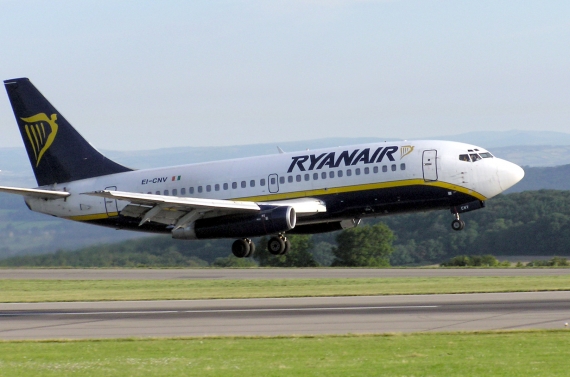
Ryanair warned cabin crew and pilots that some of them could lose their jobs if a series of strikes continue but said it was on course to hit its annual profit target despite the disruption.
The Irish low-cost carrier, Europe's largest, is facing its worst-ever week for strikes, with over 300 of its daily 2,400 flights canceled on Wednesday and Thursday due to action by cabin crew in Spain, Portugal, Italy and Belgium.
But the airline on Monday beat analyst forecasts to post a profit of 319 million euros for the three months to June 30. While profit was down 20% from the same period last year, it was ahead of the average estimate in a company poll of analysts of 305 million euros.
It said growth in revenues for optional extras grew 25% in the quarter, helping to offset a fall of 4% in average fares and higher fuel and staff costs.
The airline reaffirmed its forecast for profit for the year to be between 1.25 billion euros and 1.35 billion euros, down from a record 1.45 billion in the year to March 31.
"Strike action is bad for sentiment and creates short-term risks to earnings, but should not impactRyanair's long-term competitive position, cost leadership, financial strength or cash generation," Liberium analyst Gerald Khoo said in a note.
Ryanair's shares were down 6 percent to 14.60 euros at 0730 GMT, matching a 12-month intraday low hit in December when the airline announced plans to recognize unions. That is down almost 25% from an all-time high of 19.38 euros last August.
The results come after EasyJet, Europe's second-biggest low-cost airline, raised its profit guidance, forecasting earnings could soar by as much as 45 percent this year. Fast-growing budget airline Norwegian Air Shuttle earlier in July also beat expectations with a second-quarter net profit.
Ryanair, which flies in 37 countries and carried 130 million passengers last year, averted widespread strikes before Christmas by deciding to recognize trade unions for the first time in its 32-year history. But it has since struggled to reach agreement on terms with several of them.
It cited strikes as one of the reasons why average fares would be lower than expected this summer, with high competition and a heatwave in Northern Europe also weighing.
Average fares are expected to grow by 1% in the three months to September 30, down from an earlier forecast of 5% growth, O'Leary said.
"While we continue to actively engage with pilot and cabin crew unions across Europe, we expect further strikes over the peak summer period as we are not prepared to concede to unreasonable demands that will compromise either our low fares or our highly efficient model," O'Leary said.
"If these unnecessary strikes continue to damage customer confidence and forward prices/yields in certain country markets then we will have to review our winter schedule, which may lead to fleet reductions at disrupted bases and job losses," he added.
In a pre-recorded presentation to investors, O'Leary said market expectations for average fares in winter were "overdone" and expected fares in the period to be flat compared to last year.
Ryanair also warned that Austrian holiday airline Laudamotion, which it agreed to buy this year, would post annual losses of 150 million euros, up from an earlier estimate of 100 million. (Reuters)
Source: www.businessworld.ie

















